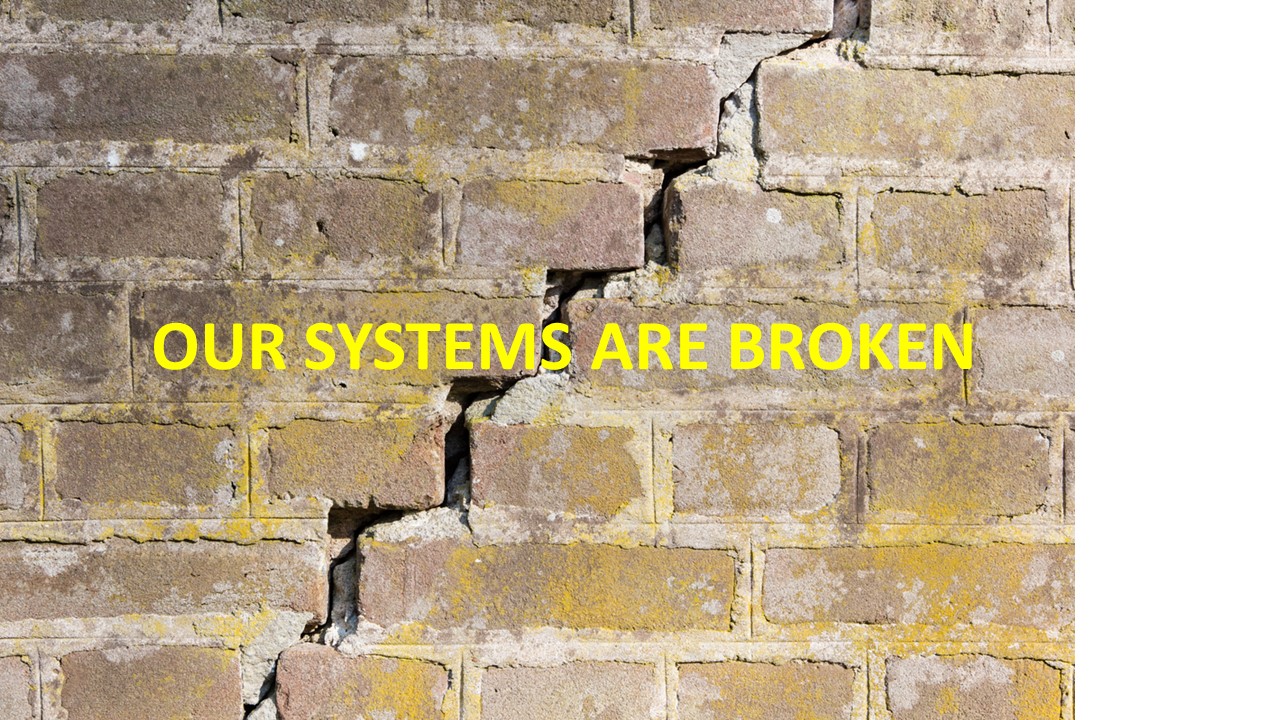Our Systems Are Broken

Last week I met with an extraordinary group of consulting colleagues in a relaxed, informal networking setting. During the gathering we covered a lot of ground as we discussed both personal and work-related subjects. More than once there was discussion about our ‘broken’ systems and how they too often limit individual, social, economic, and environmental well-being.
Health care, education, the economy, and housing were top of mind but some of us observed that many of those who were working within the systems had pretty much surrendered and were simply doing the best they could.
One colleague who was dealing with a critically ill partner put it this way, ‘The individuals were wonderful, but the systems – meaning regulations, policies, and funding - often stifled their ability to respond in the most ideal way and do what they felt was the right thing to do’.
By way of example, one issue raised in our conversations was that our local health network that was designed to integrate and simplify access to community care, refuses to communicate via email or text, insisting instead on phone, fax, or in-person meetings exclusively. No one was able to justify or support that as being the ‘right thing to do’.
We all agreed there are many stellar people working in government, social-profits, and business. Unfortunately, they are too often trapped in bad systems. These include systems for controlling finances, human resources, purchasing, communication etc.
While everyone in our group was exceedingly polite, there were differences of opinions in terms of how and why our systems were broken but also who was best positioned to provide the fixes that were urgently needed.
While everyone agreed that individual, social, environmental, and economic challenges are intrinsically linked, the reality is that we have three sectors in the mix – government, social profits, and businesses.
There are signs of progress but the sectors aren’t typically known for communicating or collaborating with one another. However, there was frustration as to why (1) more wasn’t more being done to think about the future and (2) why integrated, system-thinking services weren’t viewed as more of a priority given that people aren’t created as separate departments but the systems are designed as if they were. Worse yet, these segregated systems have become entrenched, bigger, and exceptionally difficult to change.
So while each of the three sectors have their own respective priorities, focus and modus operandi, all three also share commonalities and have important pieces of what’s needed to ensure individual, community, economic and environmental well-being both locally and globally.
The lack of priority placed on collaboration between business, social profits, and government also seems to have contributed to sometimes losing sight of the importance of being people-centred and applying holistic-thinking. We are instead bogged down by funding silos, mandates, specialization, turf protection, and egos. The average person in need of services related to social services, housing, recreation, justice, health etc. often gets lost in the complexities of the system.
Increasing ‘red tape’ has also made agility a challenge for those working in any sector, although businesses generally appear to be more agile than government and social profits.
Regardless, two things are clearer when it comes to fixing broken systems; (1) it’s clear that no one sector has all of the answers and (2) we need a different kind of leadership.
Leadership today is about courage. Courage to realize our challenges are complex and no one individual, organization, or sector can resolve them on their own. That means we have to let go of the idea that we alone have the answers. Instead, we need to strengthen our individual and organizational competencies in order to become convenors who call meetings before we have the answers, aren’t intimidated by messy, and can ensure a culture where all voices are heard. Only then, can our collective gifts, experience, and wisdom be focused on building a better future for all.
—Brenda Herchmer
Posted on 07-28-22Next entry: Why I Don’t Want to Write Like An Academic
Previous entry: The Elephant in a Dark Room

 Brenda Herchmer is the owner of Grassroots Enterprises, a community development consulting company.
Brenda Herchmer is the owner of Grassroots Enterprises, a community development consulting company.